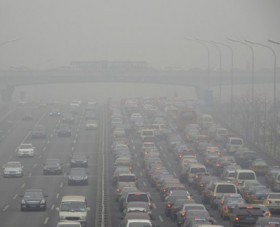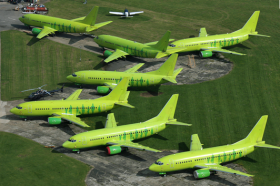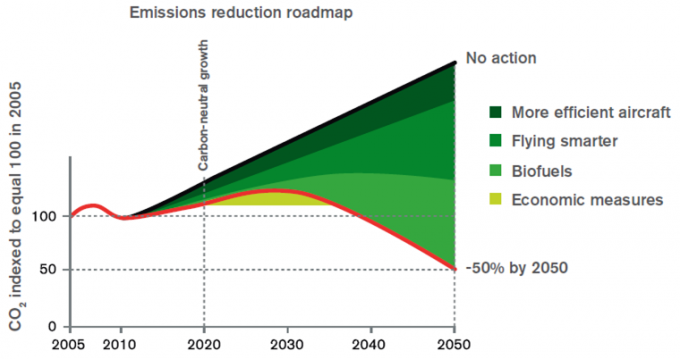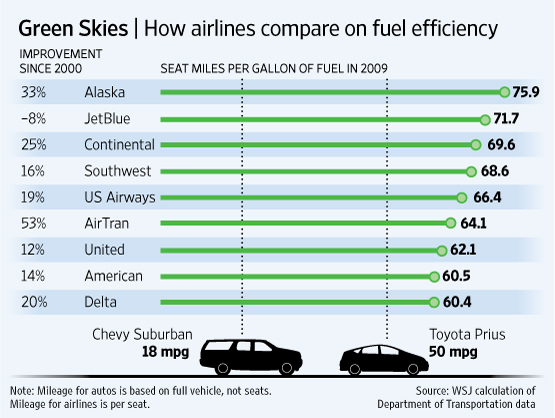
The Planet doesn’t really care about Emissions per Capita, does it – I think it is more interested in the accumulated total emission…
Question:
If each product or service I produce is a little more environmental friendly and causes a little less emissions but at the same time I push a growth-strategy – does that make me “more Sustainable”…?
…we are in this precarious situation with “almost” runaway Climate Change, pollution, depletion of species and resources because of the current Consumption-levels – staying at this level isn’t going to save us, is it…
I am not a skilled mathematician but I think I have an average knowledge of the most common rules of arithmetic… it just doesn’t “add up”.
The Automotive Industry
Recently I read somewhere that the number of passenger-cars in the world is estimated to increase by approximately 50 % to 2020, compared with 2010. This would result in around 1.2 Billion passenger cars – if we are going to reduce our emissions from cars below the current level – How low must then the emissions from new cars be?
 At the homepage of the International Organization of Motor Vehicle Manufacturers (OICA) you can find some data on number of vehicles in use, production, sales etc. Based on these data it is also possible to estimate the number of cars being scrapped.
At the homepage of the International Organization of Motor Vehicle Manufacturers (OICA) you can find some data on number of vehicles in use, production, sales etc. Based on these data it is also possible to estimate the number of cars being scrapped.
If you do some estimations using these data and normal arithmetic, it is quite easy to see some “Worrying patterns”… Not scientifically 100% correct, but Worrying enough…
- An increase of passenger cars in use by 50% in ten years is roughly equal to +4 % per year.
- During these 10 years approximately 723,000,000 new cars will be manufactured.
(Causing some 10 – 12 Billion tons of embedded CO2-emissions during production…) - Approximately 310,000,000 cars will be scrapped. (Using the current average)
- Even if the average CO2-emissions from all passenger-cars in use during this period annually could be reduced by 5 g CO2/Km – in total 50 g CO2/Km (equal to +9.5 MPG or +4.0 Km/L) over the 10 years – the total accumulated CO2-emissions will still increase by more then 10%
- If the increase of cars in use instead would be +5% per year, roughly an additional 100,000,000 more cars will be in use by 2020 and the total accumulated CO2-emissions will increase by almost 20% compared to 2010, even with an annual decrease of average emissions as described.
- To reach an annual reduction level of 5 g CO2/Km, referred to above, would need ALL new cars sold after 2010 to have an emission level below 120 g CO2/Km (equal to 50-60 MPG) and then reducing from that level – that would curb the emissions to increase “only 10%” from today’s level…
- Keeping today’s level as peak of emissions would need a very steep immediate reduction in emissions and all new cars sold from around 2015 would need to be ZERO-Emission! (0 g CO2/Km)
And the answer from the automotive industry to this challenge is…
Financial Information
If you look at car manufacturers in any of the economical magazines, financial sites or business-pages the focus is very much on “Infinite Growth” and every percentage of increased sales etc. is regarded as a “positive signal” – simultaneously any decline in sales is always defended with the launch of new more “aggressive“ marketing strategies, moving into new markets etc.
There is very little or no concern about the accumulated effects to our planet.
Public information, advertisement
If you look at marketing, it varies quite a bit depending on region and manufacturer, but in general it is very much “business-as-usual”, using the same “sales-approaches” that have proven effective before, and in general there is very little or no concern at all about the effects to our planet.
You can find some trends with a little more information about fuel economy, more efficient engines, alternative fuels etc – but often this is related to a small segment of the total production while at the same time the major production and sales have changed very little (Greenwash/Smokescreen?) – it is also always stated as an “improvement per car” and never related to ongoing growth-strategies or accumulated total emission, and it is definitely not at all in parity with the challenges we are facing.
– I suppose what they are saying is something like this;
 …Our No. 1 priority is that we want to sell as many cars as possible to get as much profit as possible, and if that eventually means that we have to make cars more environmentally friendly we will incrementally introduce such vehicles into our range, but only at the pace of “customer demand” – don’t expect us to save the planet, that’s not our responsibility…
…Our No. 1 priority is that we want to sell as many cars as possible to get as much profit as possible, and if that eventually means that we have to make cars more environmentally friendly we will incrementally introduce such vehicles into our range, but only at the pace of “customer demand” – don’t expect us to save the planet, that’s not our responsibility…
We are all collectively facing an enormous challenge to Human survival on this planet, but one of our main industries, responsible for a major part of the damaging emissions claims that they can “opt-out” and instead pursue their own goals…
…and every working day 252,517 more cars and 85,056 commercial vehicles (Link) are produced, “pushing” people even further into “car-dependency”, depleting valuable resources and increasing emissions…
The Airline Industry
 In an earlier article (Link) I made some reflections on the airline industry and how it is rapidly growing, largely hidden behind some kind of ancestral longing to travel, to discover and the urge of Globalization and therefore largely “exempt” from the sustainability debate…
In an earlier article (Link) I made some reflections on the airline industry and how it is rapidly growing, largely hidden behind some kind of ancestral longing to travel, to discover and the urge of Globalization and therefore largely “exempt” from the sustainability debate…
… Who wants to be the messenger telling about the unsustainability of behaviour that “everyone apparently wants”…
Occasionally there is some article about the EU postponing the European Emissions Trading Scheme (EU ETS) to include air traffic, after being pressured by foreign governments (US, China), a new aircraft-type having some battery-issue or delivery problems, and even more seldom something about performance-improvement.
In the IATA Annual report 2013 and on the Air Transport Action Group (ATAG) homepage the following can be found:

Source: IATA Annual report 2013
The airline industry is aiming to increase fuel efficiency by 1.5% annually until 2020. From 2020, net carbon emissions from aviation will be capped through carbon neutral* growth and by 2050 net aviation carbon emissions is going to be half of what they were in 2005.
*) This is some kind of offset-trading or global emissions trading scheme, not yet defined.
… apparently the Airline industry will try to return to “2005 levels” (levels that caused the current Climate-change) somewhere around 2040 and then decrease, largely with the help of biofuels…
Quite an amazing scenario really, especially when globally the investment in biofuels fell 47% between 2011 and 2012, and the OECD-FAO agricultural outlook 2013-2022 show an annual increase of only around 2.5% for all oil-seeds and bio-fuels combined – but maybe there will be a “Hausse” around 2030 where lots of new arable land will be “discovered” and planted with “biofuels” – hopefully the climate will still be beneficial for the cultivation – and the, by then, additional 2 Billion people and 1.2 Billion car-owners will make no claim for that partiqular piece of land… (Sarcasm)
… and what about a draught-period, with low harvest – is that a “force-majeure” to cancel flights…
I wonder if they by then also will consider to include the RFI-factor, established in 1999 by the IPCC and include also the additional GHG-effect due to emissions being made high in the atmosphere – that alone would increase the stated 689 million tonnes of “produced” CO2-emissions by approx. 60 to 1.1 Billion tonnes of equivalent CO2-emissions [!] Link
And the message “broadcasted” about flying is…
Flying is still very much left out of the sustainability discussion, (Link to previous article) it is almost like some kind of “Tabu” to talk about.
Is it because Globalization is yet another thing we should “not” talk too much about when we discuss Sustainability, since it is one of the current drivers in our economy or is it that “Technological connectivity and price comparison engines have shifted purchasing power to consumers, who have been convinced, by repeated discounting, that cheap travel is now a right – not a privilege.”
… quite frankly, the only recent public “debate” I have seen on this subject is “Whether people actively working with or advocating Sustainability should fly or not…”
On the other hand information is abundant about increasing Tourism, “Top-destination of the Year” and a veritable “tsunami” of offers to fly “cheaper-than-ever” to world-wide destinations.
Tourism and travel is one of the fastest growing sectors of our time and air travel is estimated to increase by 4-5% each year to come.
The airline organisations IATA and ATAG, which doesn’t include most low-cost airlines [!], have voluntarily committed to a “non-binding” agreement to increase “fleet fuel efficiency” by 1.5% per year until 2020 – it is nowhere stated if this is related to a specific number of passenger-miles or from the current accumulated level…
If it is related to passenger-miles (“per/capita”) and the current growth-pattern is “promoted” – a 1.5% fuel efficiency will still mean a 35 – 40% increase in accumulated CO2-emissions until 2020, compared to 2012 [?]
 Another way airlines often report on fuel consumption is to put it in relation to car-consumption. The comparison is then often done “per capita” and mile such as in the chart below – “as if this is totally comparable”…
Another way airlines often report on fuel consumption is to put it in relation to car-consumption. The comparison is then often done “per capita” and mile such as in the chart below – “as if this is totally comparable”…
Always when I see a chart like this my first thought is “Would people actually consider making the same rides they do with a plane, in a car instead?”
…how many Swedish tourists would ever consider a trip to Thailand, Greece or Turkey on their vacation – by car – or frequent business-trips across the Atlantic…
This is like comparing apples and pears – and it is deceptive since it even promotes flying as a “better alternative”… and thereby stupefy customer attitudes – while in reality such exchange between car and plane for a specific journey is “never” even considered.
In fact, if such consideration would be made, replacing plane-rides with car-rides, the number of journeys, especially long ones, would probably be heavily reduced.
If you then convert the fuel consumption to CO2-emission, and even if you add the RFI-factor, doesn’t mean the comparison becomes more relevant.
Somehow the airline industry seems to have got it wrong, claiming that Globalisation is what drives the need of flying while never having considered that continuously lowering air-fares and promoting deceptive fuel efficiency per passenger data could be one major driver of increasing Globalisation…
… look at the “exploding” number of tourist-travels – is that only because people all of a sudden have become so much more curious about other places or is it because so many more can afford to travel…
“What upsets me is not that you lied to me, but that from now on I can no longer believe you.”
– Friedrich Nietzsche
So – what about double messages…
Selecting “suitable” small pieces of information without providing the full context and consequences is seldom made “by Mistake” – it is a Choice!
(Link to previous article)
Telling investors and shareholders that your goal is continuous growth and increased “sales”, while at the same time selling customers the “benefits” from lower “per capita” emissions, is not only “Greenwash” it is deceitful, since it lulls people into a false hope that their small incremental contribution makes a big difference – and that they therefore can continue “Business-as-usual”…
This is also highly relevant when you look at how many companies use “storytelling” to promote some “excellent” sustainable product or service, but very often “fail to mention” that its only valid for a very small “segment” or even a single project, while at the same time the vast majority of products or services produced, is business-as-usual – “false pretense”.
We are in an extremely serious situation
– cheating on our next generations is simply not an option!